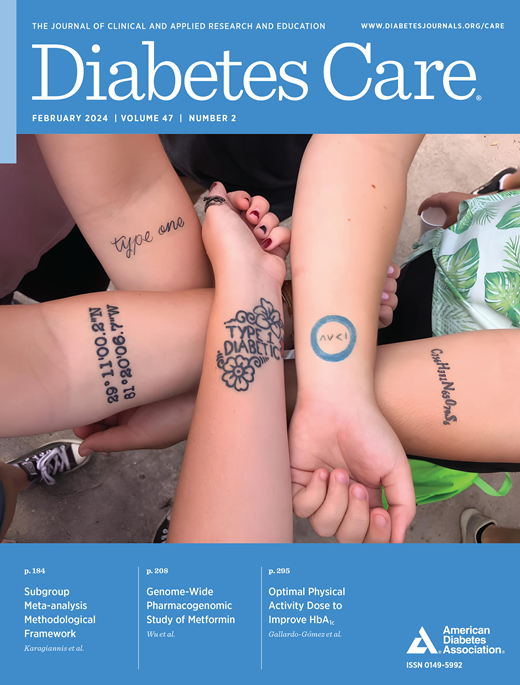透析依赖性肾衰竭的血糖管理和个体化糖尿病护理
IF 16.6
1区 医学
Q1 ENDOCRINOLOGY & METABOLISM
引用次数: 0
摘要
在美国接受慢性肾衰竭透析治疗的近 60 万人中,60% 患有糖尿病。与非糖尿病患者相比,接受透析治疗的糖尿病患者的总体存活率和心血管病存活率更低。肾衰竭相关因素使透析人群的糖化血红蛋白(HbA1c)目标外推变得不可靠,并可能改变降糖和疾病调整疗法的风险-获益曲线,因此透析环境中的糖尿病护理变得复杂。目前还没有前瞻性研究确定透析人群的最佳血糖目标,而且很少有降糖药物的随机临床试验包括透析患者。观察数据表明,较低和较高的 HbA1c 均与透析人群的死亡率有关。现有数据表明,一些降糖药物在透析人群中具有潜在的安全性和有效性,但由于研究设计和样本量的限制,无法得出确切的结论。虽然有关最佳血糖目标以及糖尿病药物安全性和有效性的特定人群知识存在差距,无法将所有普通人群糖尿病指南推广到透析依赖型糖尿病人群,但这些不确定性不应影响为透析患者提供以人为本的糖尿病护理的重要性。针对透析依赖型肾衰竭患者和非透析依赖型肾衰竭患者的糖尿病护理应该是全面的,以个人偏好和预后为基础,并结合已证实对控制血糖和降低心血管风险有益的成熟治疗方法。我们需要开展更多的研究,以了解如何应用最新的药物和技术进步为接受维持性透析的患者提供这种个性化护理。本文章由计算机程序翻译,如有差异,请以英文原文为准。
Glycemic Management and Individualized Diabetes Care in Dialysis-Dependent Kidney Failure
Of the nearly 600,000 people in the U.S. who receive dialysis for chronic kidney failure, >60% have diabetes. People receiving dialysis who have diabetes have worse overall and cardiovascular survival rates than those without diabetes. Diabetes care in the dialysis setting is complicated by kidney failure–related factors that render extrapolation of glycated hemoglobin (HbA1c) targets to the dialysis population unreliable and may change the risk-benefit profiles of glucose-lowering and disease-modifying therapies. No prospective studies have established the optimal glycemic targets in the dialysis population, and few randomized clinical trials of glucose-lowering medications included individuals receiving dialysis. Observational data suggest that both lower and higher HbA1c are associated with mortality in the dialysis population. Existing data suggest the potential for safety and effectiveness of some glucose-lowering medications in the dialysis population, but firm conclusions are hindered by limitations in study design and sample size. While population-specific knowledge gaps about optimal glycemic targets and diabetes medication safety and effectiveness preclude the extension of all general population diabetes guidelines to the dialysis-dependent diabetes population, these uncertainties should not detract from the importance of providing person-centered diabetes care to people receiving dialysis. Diabetes care for individuals with and without dialysis-dependent kidney failure should be holistic, based on individual preferences and prognoses, and tailored to integrate established treatment approaches with proven benefits for glycemic control and cardiovascular risk reduction. Additional research is needed to inform how recent pharmacologic and technological advances can be applied to support such individualized care for people receiving maintenance dialysis.
求助全文
通过发布文献求助,成功后即可免费获取论文全文。
去求助
来源期刊

Diabetes Care
医学-内分泌学与代谢
CiteScore
27.80
自引率
4.90%
发文量
449
审稿时长
1 months
期刊介绍:
The journal's overarching mission can be captured by the simple word "Care," reflecting its commitment to enhancing patient well-being. Diabetes Care aims to support better patient care by addressing the comprehensive needs of healthcare professionals dedicated to managing diabetes.
Diabetes Care serves as a valuable resource for healthcare practitioners, aiming to advance knowledge, foster research, and improve diabetes management. The journal publishes original research across various categories, including Clinical Care, Education, Nutrition, Psychosocial Research, Epidemiology, Health Services Research, Emerging Treatments and Technologies, Pathophysiology, Complications, and Cardiovascular and Metabolic Risk. Additionally, Diabetes Care features ADA statements, consensus reports, review articles, letters to the editor, and health/medical news, appealing to a diverse audience of physicians, researchers, psychologists, educators, and other healthcare professionals.
 求助内容:
求助内容: 应助结果提醒方式:
应助结果提醒方式:


